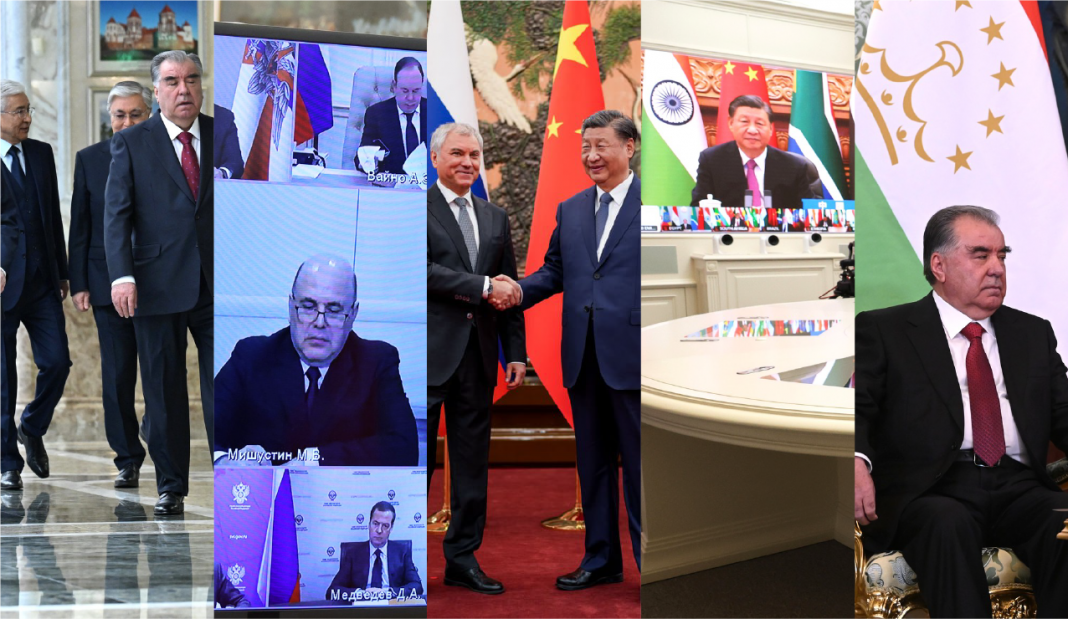This report describes the key events that significantly impacted Russia’s political, economic, and social processes.
Based on the results of the past week, the following trends can be summarised:
- Russia is once again sending a signal of readiness for negotiations. The fact that neither Xi Jinping nor Biden were present during Putin’s speech rather indicates that the leaders of the world’s largest states, having met in San Francisco, agreed on a position regarding Ukraine and Russia and conveyed this position to the leaders of the opposing states, and now took a wait-and-see approach, allowing Vladimir Putin and Vladimir Zelensky to demonstrate their positions.
- Russia’s position on the situation in the Middle East remains unchanged: it continues to try to play the role of an “outsourced peacemaker”; it continues to insist on the implementation of the Norwegian agreements regarding the creation of a Palestinian state. By and large, Russia has little influence on the situation, but in propaganda and ideological terms, it is trying to get the most out of the problem.
- According to available information, at a meeting of the Security Council of the Russian Federation, questions were raised regarding possible personnel rotations and reshuffles in the system of the Ministry of Foreign Affairs of the Russian Federation. In particular, several ambassadors may be replaced (including the ambassador to the United States), as well as changes in the leadership structure of the Foreign Ministry. In addition, the personal composition of the delegation for negotiations with the US State Department, which will take place on December 10, was considered.
This report highlights the following topics that were most relevant for Russia during 20th – 26th November:
1. Negotiations between Vladimir Putin and the President of Tajikistan Emomali Rahmon;
2. Participation of Vladimir Putin in the extraordinary BRICS summit;
3. Participation of Vladimir Putin in the extraordinary G20 summit;
4. CSTO summit in Minsk;
5. Meeting with permanent members of the Security Council of the Russian Federation;
6. Vyacheslav Volodin’s visit to China.
This Content Is Only For Subscribers
- Negotiations between Vladimir Putin and the President of Tajikistan Emomali Rahmon
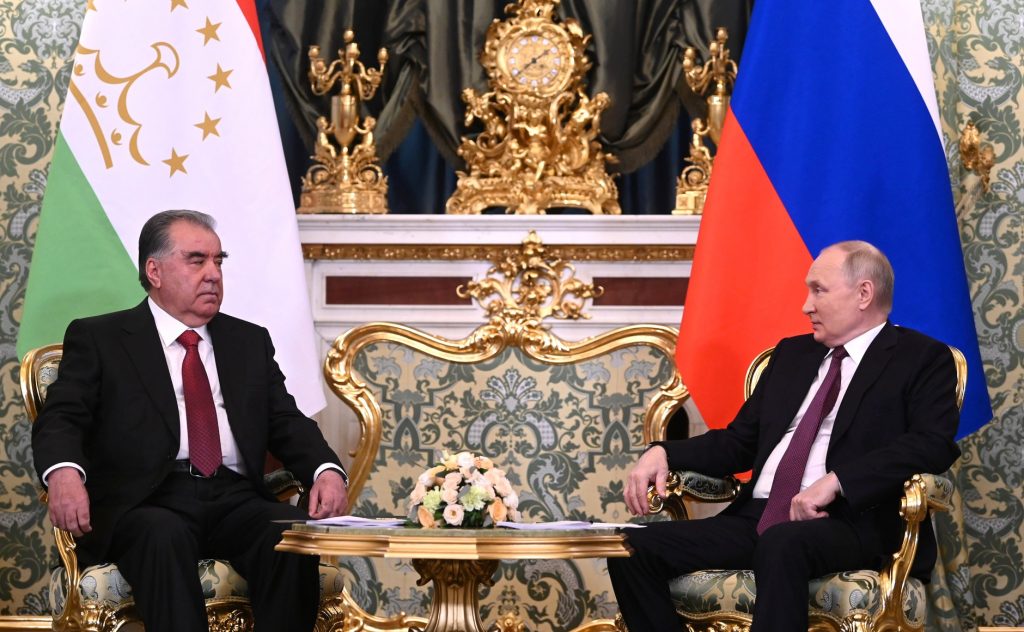
On Wednesday, November 22, Tajik President Emomali Rahmon arrived in Moscow on an official visit. On the same day, he met with Vladimir Putin for bilateral negotiations. After closed negotiations between the two presidents, a meeting took place in an expanded format, in which members of the delegations of Russia and Tajikistan also took part. During the meeting, Putin presented the President of Tajikistan with a state award – the Order of Merit for the Fatherland, III degree.
As a result of the negotiations, the parties signed several agreements:
- Plan of interaction in the industrial sector between the Ministry of Industry and Trade of the Russian Federation and the Ministry of Industry and New Technologies of Tajikistan.
- Memorandum between the Ministry of Transport of the Russian Federation and the Ministry of Transport of Tajikistan on developing cooperation in training and retraining personnel in the transport sector.
- Practical action plan for cooperation in the transport sector between the Russian Federation and the Republic of Tajikistan for 2023–2025.
- Memorandum of cooperation between the Ministry of Economic Development of the Russian Federation and the Ministry of Economic Development and Trade of the Republic of Tajikistan.
- Memorandum of understanding and cooperation between the Federal Bailiff Service of the Russian Federation and the Enforcement Service under the Government of the Republic of Tajikistan in enforcing court decisions and other authorities’ documents.
- Agreement between the Federal Customs Service (RF) and the Customs Service under the Government of the Republic of Tajikistan on mutual recognition of the relevant institutions of the authorised economic operator.
- Memorandum of understanding and cooperation on labour inspection and employment promotion between the Federal Service for Labor and Employment (RF) and the Ministry of Labor, Migration and Employment of the Republic of Tajikistan.
- Agreement on scientific and technical cooperation between the National Research Center “Kurchatov Institute” and the National Academy of Sciences of Tajikistan.
Also, on the morning of November 22, an informal breakfast between Putin and Rakhmon took place. All events took place without the participation of the press. Also, following the negotiations, a final press conference was not held.
Outcomes and outlook:
Tajikistan has transformed from a “bearish corner” of world geopolitics and an always problematic region in recent years into a serious player. Tajik President Emomali Rahmon has repeatedly demonstrated his position, daring to express public complaints against Putin. Tajikistan is a vital strategic partner of Russia in Central Asia. This country is the key to Russia’s policy regarding Afghanistan and Iran and an essential element of the security system in the entire region (considering that Tajikistan, like Kyrgyzstan, is where the interests of Russia and China lie). This is not the first year that Russian intelligence services have reported increased interest in Tajikistan on the part of British and American services. That is why Putin needs to support Rahmon’s regime in every possible way, making injections into the country’s economy (the poorest in the post-Soviet space). Moscow was sensitive to Dushanbe’s decision to request a loan from South Korea, perceived as an alarming gesture towards the United States and its satellites. Now, Russia will do everything in its power to prevent either a “colour revolution” in the interests of the United States or an Islamic revolution in the interests of radical Islamists from being carried out in Tajikistan.
- Participation of Vladimir Putin in the extraordinary BRICS summit
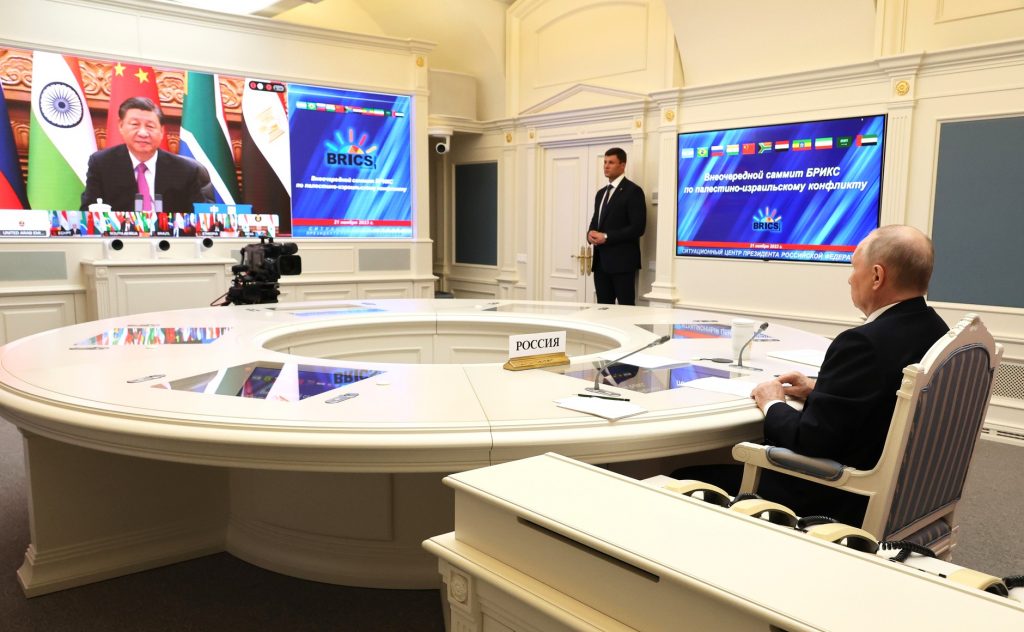
On Tuesday, November 21, an extraordinary BRICS summit was held online, the main topic of which was the Palestinian-Israeli conflict. In particular, the summit participants expressed their vision of possible steps to end the conflict. They once again stated the need to resolve the Palestinian issue by recognising the independence of Palestine. The Russian President also took part in the summit.
Putin’s key theses:
- “The loss of thousands of lives, the mass expulsion of civilians and the resulting humanitarian catastrophe are of deep concern. A colleague just spoke about the death of a large number of children. This is terrible, but when you watch how operations are performed on children without anaesthesia, it certainly evokes special feelings. All these events, in fact, are a direct consequence of the United States’ desire to monopolise mediation functions in the Palestinian-Israeli settlement and its blocking of the activities of the Middle East Quartet of international mediators.”
- “Thus, history has clearly demonstrated the unviability and counterproductivity of individual attempts to cut the “Palestinian knot.” Due to the sabotage of UN decisions, which clearly provide for the creation and peaceful coexistence of two independent and sovereign states – Israel and Palestine – more than one generation of Palestinians has been brought up in an atmosphere of injustice towards their people, and the Israelis cannot fully guarantee the security of their state.”
- “Russia’s position is consistent and non-opportunistic. We call for the joint efforts of the international community aimed at de-escalating the situation, a ceasefire and finding a political solution to the Palestinian-Israeli conflict.”
- “It is significant that all BRICS countries have similar positions regarding the need to collectively achieve a long-term and sustainable solution to the long-standing Palestinian-Israeli problem.”
- “And of course, by and large, the most pressing task is to achieve a truly long-term and sustainable truce. I agree with my Brazilian colleague that it is important to prevent other states from being drawn into the war in the Middle East and any expansion of the geography of the conflict, as well as to preserve the fragile interfaith peace.”
Outcomes and outlook:
Russia’s position on the situation in the Middle East remains unchanged: it continues to try to play the role of an “outsourced peacemaker”; it continues to insist on the implementation of the Norwegian agreements regarding the creation of a Palestinian state. By and large, Russia has little influence on the situation, but in propaganda and ideological terms, it is trying to get the most out of the problem.
- Participation of Vladimir Putin in the extraordinary G20 summit
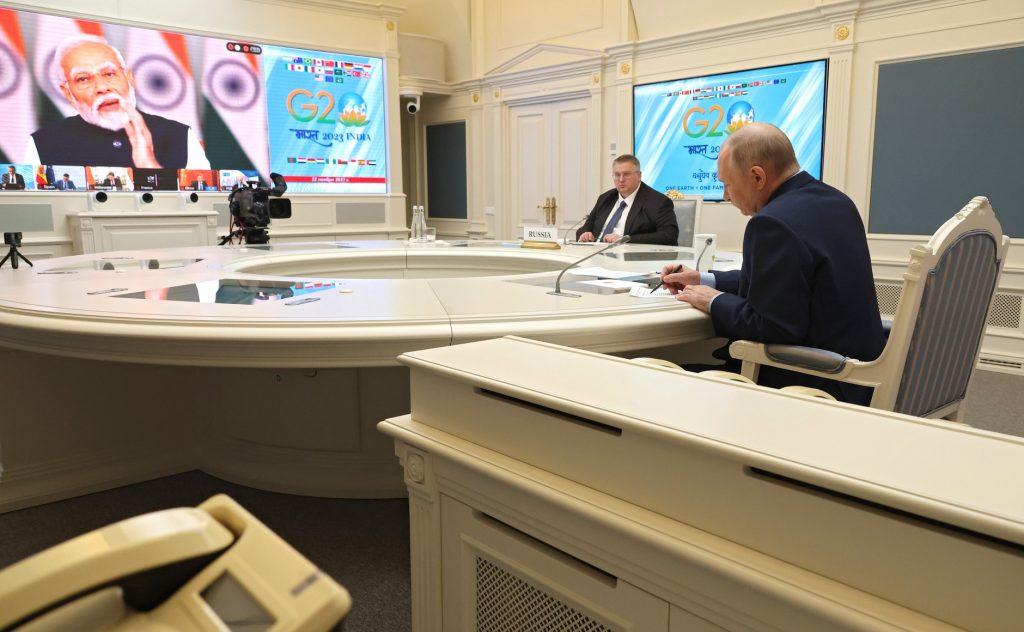
On Wednesday, November 22, at the initiative of Indian Prime Minister Narendra Modi, an extraordinary G20 summit was held online. The main topic of the meeting was summing up the results of the outgoing year and India’s chairmanship in this organization. For the first time since the beginning of Russia’s full-scale aggression against Ukraine, a Russian president took part in the G20 summit. At the same time, US President Joe Biden missed the meeting (citing a busy schedule due to his birthday and Thanksgiving celebrations) and Chinese leader Xi Jinping (the reason for his absence was not officially announced). In his speech, Putin addressed the countries of the Global South and, in his usual manner, voiced several well-known theses about a change in the world order. Also, in his speech, he mentioned Ukraine and once again stated that Russia is not giving up negotiations.
Key points from Narendra Modi’s speech:
- “On November 16 last year, my friend Indonesian President [Joko] Widodo handed over the chairmanship to me and India at a ceremony. “I said then that together we would do everything to make the G20 inclusive, comprehensive, ambitious, results-oriented and decisive.”
- “Over the past year, we have reaffirmed the belief that we live on one planet, have one family and a common destiny, and we need to avoid conflict, as we have done. We demonstrated unity and work in a spirit of cooperation.”
- “One family has the power to work for the good of humanity and the cause of peace. We can raise our voices against violence and terrorism and speak out in support of humanity. In order to live up to the expectations that the world and humanity have of us, India is ready to work hand in hand with other friends and partners.”
Putin’s key theses:
- “Some colleagues have already said in their speeches that they are shocked by “Russia’s ongoing aggression in Ukraine.” Yes, of course, military actions are always a tragedy for specific people, specific families, and the country as a whole. And, of course, we must think about how to stop this tragedy.”
- “By the way, Russia has never refused peace negotiations with Ukraine. It is not Russia but Ukraine publicly announcing that it withdraws from the negotiation process. Moreover, a decree was signed by the head of state prohibiting such negotiations with Russia.”
- “I understand that this war and the loss of life cannot but shock me. Isn’t the “bloody coup” in Ukraine in 2014, followed by the war of the Kyiv regime against its people in Donbas, shocking? Isn’t the extermination of the civilian population in Palestine, in the Gaza Strip, shocking today? Isn’t it shocking that doctors have to perform operations on children, abdominal surgeries, and use a scalpel on a child’s body without anaesthesia? Isn’t it shocking that the Secretary-General of the United Nations said that Gaza has turned into a huge children’s cemetery?”
- “The world is undergoing processes of radical transformation. New powerful centres of global economic development are emerging and strengthening. A significant share of global investment, trade and consumption activity is shifting to Asian, African and Latin American regions, where most of the world’s population lives.”
- “I would also like to note that the colossal stress that the world economy is experiencing is a direct consequence of the ill-conceived macroeconomic policies of some states. These actions are justified, including the fight against the pandemic. And the injection of trillions of dollars and euros into the economy and the banking system provoked a surge in global inflation and a rapid rise in food and energy prices. This lies at the heart of the events I spoke about.”
- “Russia stands for restoring the spirit of open and mutually beneficial international economic cooperation, based on the norms of the UN Charter and the principles of collegial and mutually respectful teamwork. It is important to achieve effective optimisation of the global economic governance system, namely, to restart the WTO in full, including its arbitration function.”
- “We are ready to work together to solve these pressing problems within the G20, as well as other international institutions, including the BRICS association, the weight and influence of which, of course, is growing; this is obvious, especially taking into account the process of its expansion”.
- “As a responsible participant in global efforts to combat climate change, Russia plans to achieve carbon neutrality no later than 2060. For this purpose, all available and effective tools are used to reduce greenhouse emissions: nuclear energy, hydropower, increasing the absorption capacity of forests, environmentally friendly technologies in all sectors of the economy.”
Outcomes and outlook:
Russia is once again sending a signal of readiness for negotiations. The fact that neither Xi Jinping nor Biden were present during Putin’s speech rather indicates that the leaders of the world’s largest states, having met in San Francisco, agreed on a position regarding Ukraine and Russia and conveyed this position to the leaders of the opposing states, and now took a wait-and-see approach, allowing Vladimir Putin and Vladimir Zelensky to demonstrate their positions. Putin decided to use the platform of the G20 summit for this purpose. His position: Russia is ready for negotiations provided that Ukraine declares its neutral status (previously, signals were sent to recognise the front line as a demarcation line), as well as the lifting of economic sanctions on the Russian Federation (hence Putin’s lengthy thoughts about restoring the spirit of open and mutually beneficial economic cooperation). The Ukrainian side does not agree to such proposals, so in the near future, we will witness the collective West’s efforts to convince Ukraine of the need for the negotiation process.
- CSTO summit in Minsk
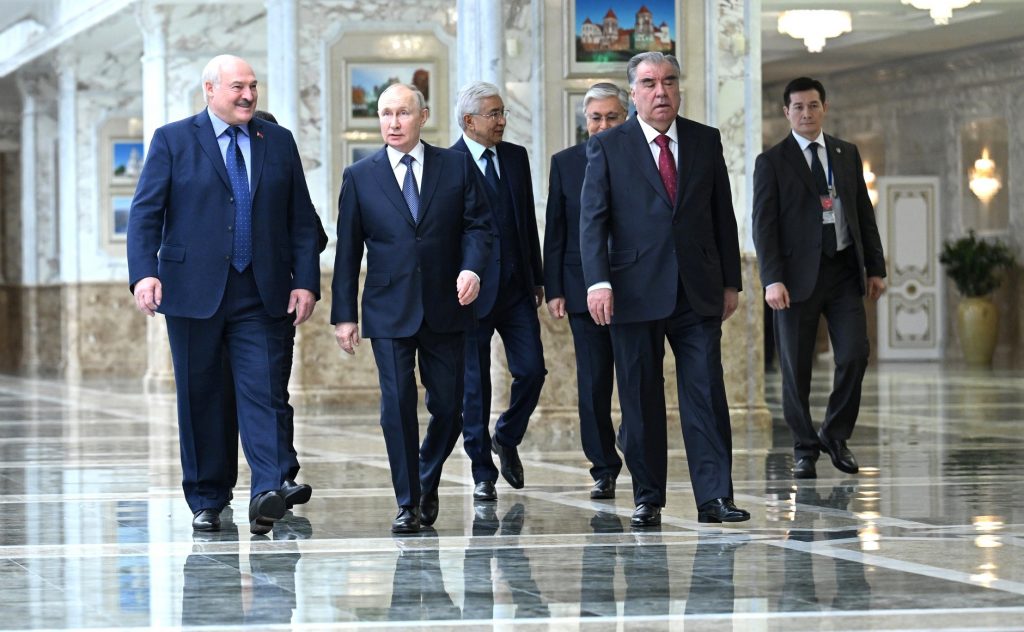
On Thursday, November 23, a regular session of the Collective Security Council of the Collective Security Treaty Organization was held in Minsk (Belarus). The session discussed key interaction issues between CSTO members, including further improvement of the collective security system and current international and regional problems.
Russian President Vladimir Putin, Belarusian President Alexander Lukashenko, Kazakhstan President Kassym-Jomart Tokayev, Kyrgyz President Sadyr Japarov, Tajik President Emomali Rahmon and Secretary General of the Collective Security Treaty Organization Imangali Tasmagambetov attended the summit. After negotiations in a narrow format, a plenary meeting of the CSTO Collective Security Council was held. From the Russian side, the meeting was attended by Secretary of the Security Council Nikolai Patrushev, Presidential Aide Yuri Ushakov, Defense Minister Sergei Shoigu, Deputy Head of the Presidential Administration – Presidential Press Secretary Dmitry Peskov, Deputy Minister of Foreign Affairs Alexander Pankin, as well as the Ambassador Extraordinary and Plenipotentiary of Russia to Belarus Boris Gryzlov.
Key theses:
- Lukashenko: “In terms of the development of the geopolitical situation, the year was rapid, and accordingly, the schedule of our work together with you was intense. Since spring, the Republic of Belarus has hosted CSTO events almost every month: the Council of the Parliamentary Assembly, then intersessional meetings of statutory bodies at the ministerial level, a coordination meeting of the leadership of relevant government bodies of the CSTO member states to counter transnational threats such as drug trafficking, illegal migration, emergencies, challenges in the field of biological safety, cybersecurity.”
- Lukashenko: “Exactly a year ago, during the session of the Collective Security Council in Yerevan, we voiced the priority directions of the chairmanship of the Republic of Belarus both internally and externally. On the internal side, we sought to increase the cohesion of the CSTO member states to strengthen the organisation itself and ensure security and stability in the area of responsibility. On the external contour, we aimed to strengthen the organisation’s role and significance in the international relations system.”
- Putin: “It is important that this year the CSTO’s contacts with our natural partners have also developed, I mean the Shanghai Cooperation Organization and the CIS.”
- Putin: “Cooperation between intelligence services and law enforcement agencies has been consistently strengthened. In particular, the CSTO operation “Mercenary” continued, aimed at suppressing recruitment and blocking exit channels for citizens of our countries to participate in the activities of international terrorist groups.”
- Putin: “The CSTO Coordination Council on Biological Safety has started working. His focus is on preventing threats associated with the development and use of biological weapons, ensuring radiation, chemical and medical protection.”
- Putin: “I will also mention that military-technical cooperation between the organisation’s member states is expanding. The CSTO Interstate Commission on Military-Economic [Cooperation], created on Russia’s initiative, is actively participating in this.”
Outcomes and outlook:
The CSTO today is an ineffective institution that unites countries that are militarily dependent on Russia. It is interesting (but simultaneously predictable) that Prime Minister of Armenia Nikol Pashinyan did not participate in the summit. This is evidence of the CSTO crisis. The meeting itself was somewhat ritualistic – summing up the year’s results, declaring plans for the next year, and opportunities for cooperation within the framework of the agreements, with the condition of not violating the sanctions regime imposed by the West. Putin must show that the CSTO is an effective structure, especially in the current situation. And Belarus, where the meeting took place, is considered as a model of military-technical cooperation within the CSTO.
- Meeting with permanent members of the Security Council of the Russian Federation
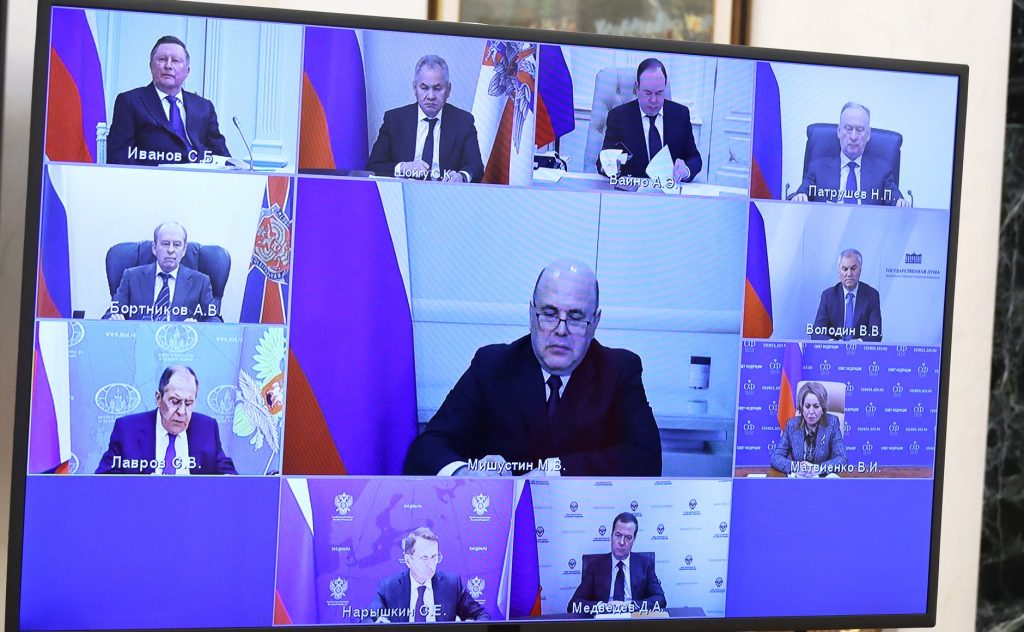
On Friday, November 24, Vladimir Putin held a regular meeting with permanent members of the Security Council of the Russian Federation. As Ascolta has repeatedly noted in the past, this type of meeting is regularly used by Putin to demonstrate a collective decision-making format on key issues. This time, the main topic of the meeting was the issue of organising the work of Russian foreign institutions, as well as discussing issues related to organising interaction with its closest neighbours in the post-Soviet space.
The meeting was attended by Prime Minister Mikhail Mishustin, Chairman of the Federation Council Valentina Matvienko, Chairman of the State Duma Vyacheslav Volodin, Deputy Chairman of the Security Council Dmitry Medvedev, Head of the Presidential Administration Anton Vaino, Secretary of the Security Council Nikolai Patrushev, Foreign Minister Sergei Lavrov, Defense Minister Sergei Shoigu, Director of the Federal Security Service Alexander Bortnikov, Director of the Foreign Intelligence Service Sergei Naryshkin and Special Representative of the President for Environmental Activities, Ecology and Transport Sergei Ivanov.
Outcomes and outlook:
According to available information, at a meeting of the Security Council of the Russian Federation, questions were raised regarding possible personnel rotations and reshuffles in the system of the Ministry of Foreign Affairs of the Russian Federation. In particular, several ambassadors may be replaced (including the ambassador to the United States), as well as changes in the leadership structure of the Foreign Ministry. In addition, the personal composition of the delegation for negotiations with the US State Department, which will take place on December 10, was considered.
- Vyacheslav Volodin’s visit to China
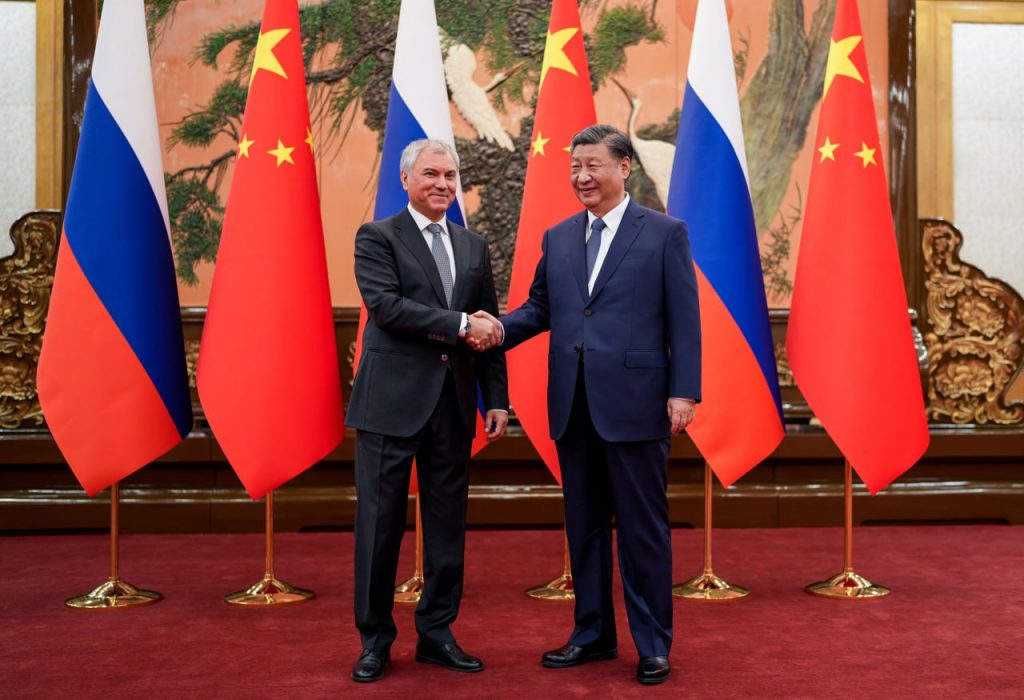
On Tuesday, November 21, Chairman of the State Duma of the Russian Federation Vyacheslav Volodin began his official visit to China. In particular, Volodin met with Chinese President Xi Jinping, during which the parties discussed several issues in relations between the two states.
Key theses:
- Volodin: “Thanks to your relations, our countries are not only strategic partners but also strategic friends.”
- Volodin: “The task of parliament is to legislate all the decisions that have been reached at your level, to do everything possible on our part so that, within the framework of the parliamentary dimension, we also contribute to developing relations between our countries and peoples.”
- Xi Jinping: “You are always actively working to promote Chinese-Russian relations and multifaceted cooperation, and have made and are making a positive contribution to strengthening the traditional friendship of our peoples.”
- Xi Jinping: “We look forward to further deepening cooperation between the State Duma and the NPC of China to create a solid legal basis for the development of bilateral relations for the benefit of our peoples.”
Outcomes and outlook:
Vyacheslav Volodin was given a genuinely high reception – he was received by Xi Jinping, and not just the Chairman of the Standing Committee of the National People’s Congress Zhuo Leji (as required by protocol). The conversation lasted almost two hours – first a protocol meeting and then about forty minutes tete-a-tete. Interestingly, the delegation also visited Nanjing, where Volodin participated in official ceremonies, and some of the people from the delegation visited the Research Institute of Unmanned Aerial Vehicles and the 56th Research Institute of Computer Technology. According to available data, it was in Nanjing that the Russian delegation agreed with the PRC on constructing a tunnel under the Kerch Strait – specialists from the Chinese Academy of Engineering Troops will plan it.

